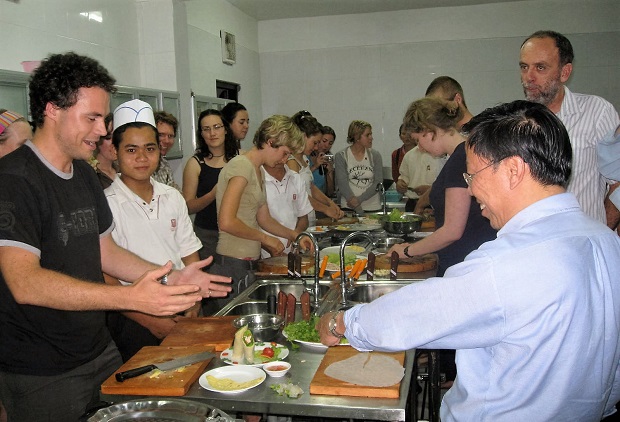Developing tourism… from the kitchen
According to analysis of the EU-funded capacity development programme for environmentally and socially responsible tourism in Viet Nam (EU-ESRT), Da Nang is attractive to visitors, from both home and abroad, because of 11 main factors. They are: beautiful landscapes, fresh air, cuisine, reasonable prices, good accommodation establishments, nice weather and climate, exciting cultural activities, easy travelling, tourist information, special handicrafts, and convenient facilities for children.
 |
| VAVC and ANU students exchanging cuisine culture |
From amongst these criteria, the city has chosen cuisine as one of the key factors to further the development of its tourism.
Over recent years, Da Nang’s range of available cuisines has grown to meet the increasing demands of locals and visitors. In addition to local foods such as ‘My Quang’ (Quang Noodles), ‘banh trang cuon thit heo’ (pork and vegetables wrapped in soft rice paper), and seafood, the city has enriched its culinary treasures through welcoming international cuisines such as Italian, Japanese, South Korean, Chinese, Indian and Laotian.
Mr Nguyen Xuan Binh, Deputy Director of the city’s Tourism Department, highlighted the vital role the many talented chefs have had in bringing local dishes into the culinary culture. They have played an important role in re-introducing forgotten local traditional dishes, and in making them more exquisite with modern-day ingredients.
Da Nang now has a Chefs’ Club with over 300 members. The club encourages its members to exchange and share their experiences in order to collectively enhance their professional skills, promote the quintessence of the local culinary culture, and boost the development of the local tourism sector.
To catch up with the increasing interest in cuisines, and for the development of tourism as a whole, cheffing is emerging as a new career trend for young people. Many local young people are now registering for cookery training courses at vocational schools, and as a result there has been a sharp increase in the number of vocational schools in the city which offer the subject.
One of them is the Viet Nam-Australia Vocational Senior College (VAVC) in Alley 476/8 on Dien Bien Phu.
The college’s principal, Mr Dang Phuc Sinh, said “Amongst its 10 training majors, my college has been focusing on expanding and enhancing the training quality of cookery and hotel management majors which have been chosen as key majors in the central region and across the world. The main reason seems to be that cuisine, known as cooking arts, is considered to be the best way to advertise the image of Viet Nam’s tourism to international friends.”
He added that every year VAVC organises cuisine cultural exchange activities with students from the Australian National University (ANU). During these events, many delicious dishes, imbued with Vietnam’s cultural identity and including ‘pho’ (Vietnamese noodle soup) and ‘goi cuon’ (Vietnamese spring rolls), are introduced to the foreign students.
In addition to VAVC, there are many other such schools in the city, including the Vocational Tourism College at 68 Le Dinh Duong, and the Netspace Cuisine Vocational School at 3 Phan Thanh Tai.
Recently, Da Nang has hosted some national-level open cookery contests with the aim of raising public awareness about cheffing as a career, and creating a useful opportunity for chefs to exchange their experiences and enhance their professional skills.
Most notably, chef Nguyen Huu Hau, a former student of VAVC, and his 2 teammates, all from the InterContinental Danang Sun Peninsula Resort, won the first and second prizes in the national-level Chiec Thia Vang (Golden Spoon) Contest in 2013 and 2016 respectively.